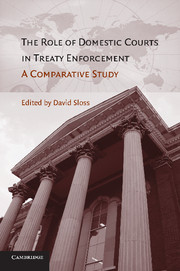Book contents
- Frontmatter
- Contents
- Contributors
- Preface
- Acknowledgments
- 1 Treaty Enforcement in Domestic Courts: A Comparative Analysis
- 2 Does International Law Obligate States to Open Their National Courts to Persons for the Invocation of Treaty Norms That Protect or Benefit Persons?
- 3 Australia
- 4 Canada
- 5 Germany
- 6 India
- 7 Israel
- 8 The Netherlands
- 9 Poland
- 10 Russian Federation
- 11 South Africa
- 12 United Kingdom
- 13 United States
- 14 The Role of Domestic Courts in Treaty Enforcement: Summary and Conclusions
- Index
Preface
Published online by Cambridge University Press: 06 January 2010
- Frontmatter
- Contents
- Contributors
- Preface
- Acknowledgments
- 1 Treaty Enforcement in Domestic Courts: A Comparative Analysis
- 2 Does International Law Obligate States to Open Their National Courts to Persons for the Invocation of Treaty Norms That Protect or Benefit Persons?
- 3 Australia
- 4 Canada
- 5 Germany
- 6 India
- 7 Israel
- 8 The Netherlands
- 9 Poland
- 10 Russian Federation
- 11 South Africa
- 12 United Kingdom
- 13 United States
- 14 The Role of Domestic Courts in Treaty Enforcement: Summary and Conclusions
- Index
Summary
As I prepare to send this book to the printer, President Obama is evaluating potential nominees to fill Justice Souter's soon-to-be-vacant slot on the United States Supreme Court. The selection of the next Supreme Court Justice could have significant implications for the international legal system and for the United States' participation in that system.
The last two individuals appointed to the Supreme Court – Chief Justice Roberts and Justice Alito – view international law with a mixture of contempt and indifference, as evidenced by the Chief Justice's 2008 opinion in Medellin v. Texas (which Justice Alito joined). They apparently view their job, in part, as one of shielding the domestic legal system from the unwanted intrusion of international law. Their elevation to the nation's highest court exemplifies a broader trend in which the judicial branch in the United States has become a key obstacle to the nation's performance of its international treaty obligations.
This book demonstrates that U.S. judges are out-of-step with their counterparts in other modern democratic nations. In most of the nations surveyed in this volume, domestic courts play a constructive role in promoting compliance with national treaty obligations by providing remedies to private parties who are harmed by a violation of their treaty-based rights. For most of United States history, judges in this nation played a similar role: they routinely enforced treaties on behalf of private parties, as envisioned by the Constitution's founders.
- Type
- Chapter
- Information
- The Role of Domestic Courts in Treaty EnforcementA Comparative Study, pp. xxv - xxviPublisher: Cambridge University PressPrint publication year: 2009

